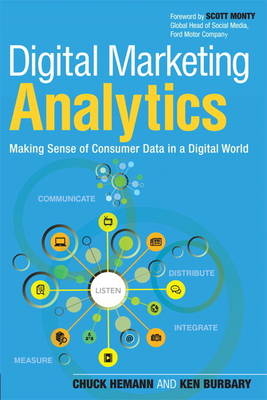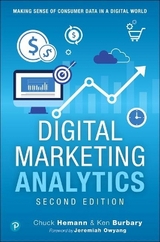
Digital Marketing Analytics
Que Corporation,U.S. (Verlag)
978-0-7897-5030-3 (ISBN)
- Titel erscheint in neuer Auflage
- Artikel merken
Why hasn’t all that data delivered a whopping competitive advantage? Because you’ve barely begun to use it, that’s why! Good news: neither have your competitors. It’s hard! But digital marketing analytics is 100% doable, it offers colossal opportunities, and all of the data is accessible to you. Chuck Hemann and Ken Burbary will help you chop the problem down to size, solve every piece of the puzzle, and integrate a virtually frictionless system for moving from data to decision, action to results! Scope it out, pick your tools, learn to listen, get the metrics right, and then distill your digital data for maximum value for everything from R&D to CRM to social media marketing!
• Prioritize—because you can’t measure, listen to, and analyze everything
• Use analysis to craft experiences that profoundly reflect each customer’s needs, expectations, and behaviors
• Measure real social media ROI: sales, leads, and customer satisfaction
• Track the performance of all paid, earned, and owned social media channels
• Leverage “listening data” way beyond PR and marketing: for strategic planning, product development, and HR
• Start optimizing web and social content in real time
• Implement advanced tools, processes, and algorithms for accurately measuring influence
• Integrate paid and social data to drive more value from both
• Make the most of surveys, focus groups, and offline research synergies
• Focus new marketing and social media investments where they’ll deliver the most value
Foreword by Scott Monty
Global Head of Social Media, Ford Motor Company
Chuck Hemann, Director of Analytics for WCG, has spent the last eight years providing strategic counsel on digital analytics, measurement, online reputation, and social media. He was previously VP of Digital Analytics for Edelman Digital and VP of Digital Strategy and Analytics for Ogilvy Public Relations. He has worked with global brands from Intel to General Mills to Pfizer. Ken Burbary, Chief Digital Officer at Interpublic’s Campbell Ewald, has 16 years of online marketing and advertising experience, including a deep background in digital and social media. He served as VP—Group Director, Strategy and Analysis at Digitas, working with global brands from American Express and Bank of America to P&G and GM.
1 Understanding the Digital Media Landscape 1
Digital Media Types 2
Paid Media 3
Owned Media 6
2 Understanding Digital Analytics Concepts 13
Starting at the Top 14
Determining Your Owned and Earned Social Metrics 15
Owned Social Metrics 15
Earned Social Media Metrics 21
Demystifying Web Data 22
Searching for the Right Metrics 23
Paid Searches 24
Organic Searches 25
Aligning Digital and Traditional Analytics 26
Primary Research 26
Traditional Media Monitoring 27
Traditional CRM Data 28
Bringing It All Together 28
The Reporting Time Line 28
The Reporting Template 29
Different Strokes for Different Folks 29
3 Picking the Tools of the Trade 31
Identifying a Social Media Listening Tool 32
Data Capture 33
Spam Prevention 34
Integration with Other Data Sources 34
Cost 34
Mobile Capability 35
API Access 35
Consistent User Interface 36
Workflow Functionality 36
Historical Data 36
Understanding Social Media Engagement Software 37
Easy-to-Navigate User Interface 38
Reliability 39
Robust Analytics Dashboards 39
Beware of the Black Box Algorithm 40
Mobility 40
CRM Hooks 40
Social Governance 40
Monitoring Platform Integration 41
Purchasing Social Media Engagement Tools 41
Who Decides Which Tool to Buy? 41
Which Tools Should You Evaluate? 42
How Do You Manage Growth? 43
How do you Establish a Long-Term Partnership with Your Listening Provider? 43
Conclusion 43
4 Tools: Social Media Listening 45
Social Media Listening Evolution 46
Social Media Listening in the Present Day 51
Understanding Sysomos 52
Radian6’s Effect on the Marketing Community 55
The Best of the Rest 59
International Listening: The New Frontier 63
What’s Next for Social Media Listening? 63
5 Tools: Search Analytics 65
Understanding the Basics of Search 66
Search Analytics Use Cases 67
Free Tools for Collecting Insights Through Search Data 69
Google Trends 69
YouTube Trends 72
The Google AdWords Keyword Tool 76
Yahoo! Clues 78
Paid Tools for Collecting Insights Through Search Data 80
The BrightEdge SEO Platform 81
Wrapping up Search Analytics 83
6 Tools: Audience Analysis 85
What Is Audience Analysis? 86
Audience Analysis Use Cases 87
Digital Strategy 88
Content Strategy 88
Engagement Strategy 89
Search Engine Optimization 89
Content Optimization 89
User Experience Design 89
Audience Segmentation 90
Audience Analysis Tool Types 90
Additional Audience Analysis Techniques 94
Conversation Typing 94
Event Triggers 95
7 Tools: Content Analysis 97
Content Audits 99
Content Audit Checklist 100
Real-Time Analytics 102
Optimizing Content Distribution 106
Analyzing Content Consumption 108
Learning Agendas 109
Classifying Results for Content Analysis 110
8 Tools: Engagement Analysis 113
Introducing SMES 115
Using Robust Analytics Dashboards 117
Scheduling Content 118
Posting to All Major Social Media Networks 119
Uploading Multimedia Content 120
Geo-Targeting Posts 120
Post Tagging 120
Using an SMES Tool for a Small to Medium-Size Business 121
HootSuite 121
Argyle Social 122
Understanding the Enterprise SMES Landscape 123
Spredfast 124
Wildfire 125
Sprinklr 127
Vitrue 130
Buddy Media 131
The Future of SMES Tools 132
9 Understanding Digital Influence 135
Understanding the Reality of Digital Influence 136
The “Tipping Point” Phenomenon 137
The Community Rules Phenomenon 138
Developing a Modern-Day Media List 139
Using the Tools of the Trade 141
Klout 141
PeerIndex 147
Online Versus Offline Influence 151
Using the Influencer List 151
10 Developing Your Social Media Listening Program 155
How Other Companies Are Listening Today 156
Using Listening Data for Program Planning 156
Utilizing Listening Data for Ongoing, Proactive Communications 158
Understanding What Listening Can Do 160
Real-Time Content Development 161
Developing Better Relationships with Customers 162
Gaining Product Knowledge Through Listening 163
Marketing Through Conversation 163
Gathering Business Intelligence 164
Implementing Your Listening Program 165
Sharpening Your Listening Weapon 166
Developing Your Training Program 166
Setting Up a Reporting Template 168
Responding to Online Conversations 169
11 How to Use Listening to Inform Marketing Programs 171
Understanding the Conversation Audit 173
Scoping the Conversation Audit 174
Elements of a Conversation Audit 176
Fitting the Conversation Audit into the Program Planning Continuum 178
Identifying Online Influencers 179
Conducting Social Brand Benchmarking 182
Conclusion 185
12 Using Online Data to Anticipate a Crisis 187
Developing a Modern-Day Issues Management Plan 188
Identifying Known Issues 190
Listing the Known Issues 190
Knowing the Share of Conversation Online 191
Knowing Profile Pro and Con Influencers 193
Briefing and Getting to Know the Influencers 193
Placing the Right Content 193
Knowing the Positive and Negative Words 194
Tagging the Right Words 195
Crisis Day Monitoring and Ongoing Reporting 196
Dealing with the Issue Hitting 196
Developing Your Content Plan 197
Developing Your Reporting Plan and Reporting Cadence 198
Correcting the History After a Crisis Is Over 200
Evaluating Your Preliminary Research 201
Identifying Key Third Parties and a Content
Syndication Plan 201
13 Improving Customer Service 203
The Social Customer Service Conflict 206
Understanding the Customer 207
Understanding Customer Intent 208
Personalizing the Customer Experience 209
Social Customer Service Models 209
The Ad Hoc Stage of Customer Service 209
The Limited Stage of Customer Service 210
The Formal Stage of Customer Service 210
Delta Air Lines 210
14 Launching a New Product 217
General Overview of the Product Lifecycle 218
The Product Lifecycle Introduction Phase 220
What Is the Consumer Reaction to Product X? 222
What Are the Consumer Concerns About Product X? 223
What Are the Consumer’s Unmet Needs? 224
The Product Lifecycle Growth Phase 224
What Are the Communities, Sites, and Social Platforms in Which Product X Is Being Discussed, Shared, and Evaluated? 226
Who Are the Influencers in the Product X Conversation? 227
What Is the Consumer Reaction to Retail/Promotions for Product X? 227
The Product Lifecycle Maturity Phase 228
What Consumer Trends and Preferences Have Emerged Around Product X Use? 230
What Related Products Do Consumers Show Interest In? 231
Conclusion 231
15 Formulating Your Research Plan 233
Developing Your Source List 234
Identifying Data Sources 235
Picking the Channels for Analysis 236
Identifying Search and Source Languages 237
Nailing Down the Research Methods 238
Developing a Hypothesis 239
Time Frame for Analysis 241
Identifying the Project Team 242
Determining the Depth of Analysis 243
Building the Coding Framework 244
Taking a Sentiment Approach 245
Filtering Spam and Bots 246
16 Making Reports Easy to Understand and Communicate 247
Constructing Reports 248
Building a Report from Back to Front 249
Ensuring That You Have a Reasonable Hypothesis 251
Focusing on the Five Ws 252
Formatting Reports 253
Understanding Your Report Time Frame 254
Delivering a Report 255
Understanding Report Use Cases 256
The Executive-Level Use Case 257
The Management-Level Use Case 258
The Analyst-Level Use Case 259
Building a Central Repository of Information 260
Command Centers 260
Web-Based Applications 262
17 Search Analysis 265
Search Analytics for Digital Strategy 268
Search Analytics for Content Strategy and Planning 272
Search Analytics for Paid Advertising 273
18 ROI = Return on Investment 275
Defining ROI 276
Return on Engagement (ROE) 277
Return on Influence 278
Return on Experience 280
Properly Tracking ROI 280
Understanding the Top-Down Revenue Measurement Approaches 281
Utilizing Bottom-Up Measurement Models 284
19 Creating the Best-Practice Measurement Scorecard 289
Understanding Measurement Fundamentals 290
Conducting Benchmark Research 291
Strategy Development 293
Tactical Elements 294
Measurement Practices 295
Developing Your Measurement Reporting Cadence 297
Annual Reporting 298
Quarterly Reporting 299
Monthly Reporting 302
Daily/Hourly Reporting 302
20 Mobile Analytics: How Mobile Is Different than Other Digital Channels 305
Understanding the Current Mobile Market Landscape 307
Growth in Smartphone Adoption 307
The Battle Between iOS and Android 309
The Explosion of Global Mobile Web Traffic 311
The Introduction of Mobile Advertising 312
Identifying What Is Next for Mobile Marketing 314
Increased Use of Apple Passbook 315
Improvements in Facebook’s Mobile Functionality 316
Expansion of Location-Based Technologies 317
Increased Strength of Mobile Measurement 318
The Current State of Measuring Mobile
Marketing Activities 318
Mobile Device Reporting 319
Audience/Visitor Metrics 319
Mobile App Performance 320
The Future State of Measuring Mobile Marketing Activities 321
21 Social CRM 323
Defining Social CRM 325
Rolling Out a Social CRM Initiative 326
Identifying a Social CRM Solution 331
Batchbook from BatchBlue 331
The Jive Social Business Platform 332
The Lithium Social Customer Suite 332
The Meltwater Buzz Engage Module 333
Nimble 334
SugarCRM 334
Analyzing the Future of Social CRM 334
22 The Future of Digital Data: Business Intelligence 337
Watching How the Digital Analytics Disciplines Evolve 339
Predicting the Future of Social Media Listening 339
Diving into Search Analytics 341
Looking into the Audience Analysis Crystal Ball 342
Forecasting the Content Analysis of the Future 343
Extrapolating the Path of Engagement Analytics 345
Knowing the Influencer Analysis Landscape 346
Understanding Where Digital Analytics Goes from Here 347
Bridging the Analytics Talent Gap 347
Housing Your Customer Data 350
Index 353
| Sprache | englisch |
|---|---|
| Maße | 156 x 231 mm |
| Gewicht | 514 g |
| Themenwelt | Wirtschaft ► Betriebswirtschaft / Management ► Marketing / Vertrieb |
| ISBN-10 | 0-7897-5030-9 / 0789750309 |
| ISBN-13 | 978-0-7897-5030-3 / 9780789750303 |
| Zustand | Neuware |
| Informationen gemäß Produktsicherheitsverordnung (GPSR) | |
| Haben Sie eine Frage zum Produkt? |
aus dem Bereich



